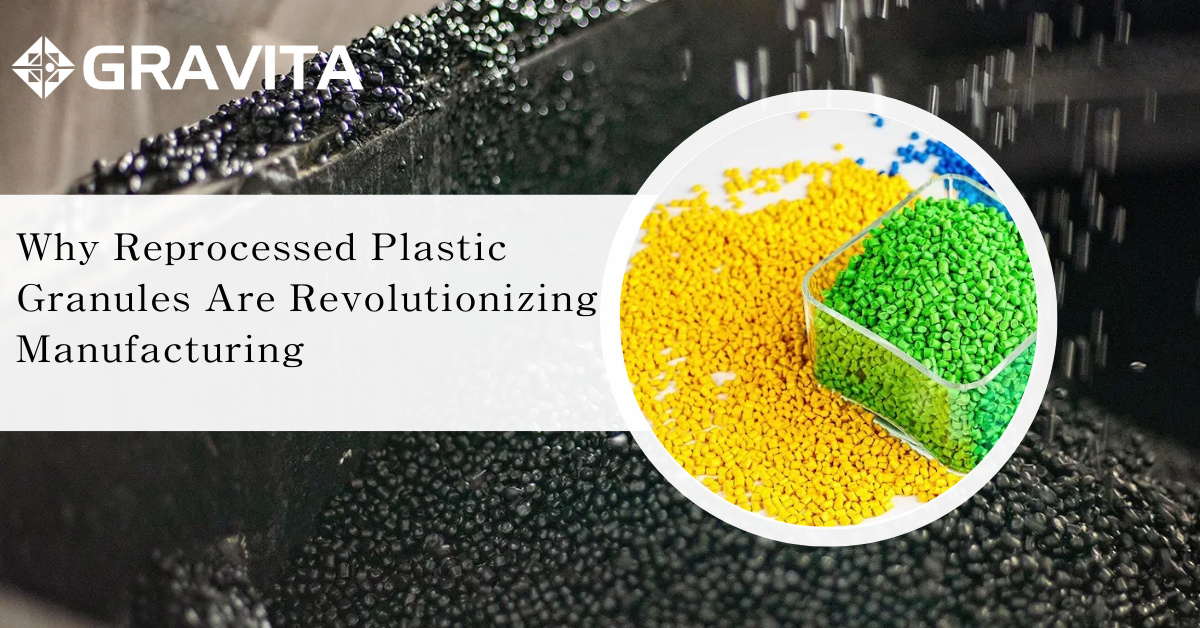
Industries around the world are rapidly shifting toward sustainable practices. One of the key innovations powering this shift is the use of Reprocessed Plastic Granules. These small pellets, made from plastic waste, are emerging as a reliable, scalable, and environmentally responsible raw material for manufacturers.
What Are Reprocessed Plastic Granules?
Reprocessed Plastic Granules are uniform plastic pellets produced from post-consumer and post-industrial plastic waste. Through advanced recycling processes, discarded plastics are cleaned, melted, and extruded into reusable granules.
They are engineered to serve as an alternative to virgin plastic and are used in a wide range of applications such as packaging, automotive parts, home products, and building materials.
How Reprocessed Plastic Granules Benefit Manufacturers
1. Cost Reduction
Using reprocessed materials significantly lowers raw material expenses. Compared to virgin plastic, Reprocessed Plastic Granules are more affordable and stable in price, making them ideal for bulk production.
2. Lower Energy Consumption
The energy required to produce Reprocessed Plastic Granules is considerably less than that needed for virgin plastic. This not only cuts manufacturing costs but also reduces the environmental footprint of production.
3. Compliance with Environmental Norms
Government regulations, particularly around EPR (Extended Producer Responsibility), now push companies to include recycled materials in their supply chain. Reprocessed Plastic Granules help businesses meet these regulations without compromising on quality.
4. Reliable Performance
Thanks to improvements in recycling technologies, modern Reprocessed Plastic Granules offer reliable strength, flexibility, and thermal stability. These features make them suitable for use across various industries.
Key Industrial Applications
Reprocessed Plastic Granules are used across many sectors, including:
● Packaging: Bottles, films, containers
● Automotive: Trim panels, battery casings, interiors
● Consumer Goods: Bins, furniture, kitchenware
● Construction: Pipes, fittings, insulation panels
Their versatility makes them an essential material for manufacturers looking to align with sustainability goals.
Supporting a Circular Economy
The growing use of Reprocessed Plastic Granules supports the circular economy model. By turning waste into usable resources, industries help minimize landfill pressure and reduce their dependence on fossil-fuel-based virgin plastic.
Incorporating these granules into production cycles means materials can be reused multiple times, keeping them in circulation and out of the environment.
Addressing Challenges with Technology
While some concerns persist around consistency and purity, modern recycling plants now use:
● Optical and near-infrared (NIR) sorting systems
● Contamination control protocols
● Quality testing and grading systems
These technologies ensure that Reprocessed Plastic Granules meet industry-grade specifications and are safe for use in demanding environments.
The Role of Government and Market Demand
The Indian government’s push for sustainable practices, including EPR norms, is accelerating the adoption of Reprocessed Plastic Granules. Globally, similar policies and corporate sustainability goals are contributing to increased demand.
In parallel, consumers are becoming more conscious of eco-friendly products, leading brands to incorporate recycled materials into their manufacturing and packaging processes.
Innovation in Material Science
Continuous innovation is further improving the quality and usability of Reprocessed Plastic Granules. Blended granules, color-specific batches, and additive-enhanced variants are now available, enabling manufacturers to choose tailored solutions for their needs.
Researchers and recyclers are working together to develop granules that mimic the mechanical performance of virgin polymers, making them even more attractive to mainstream industries.



